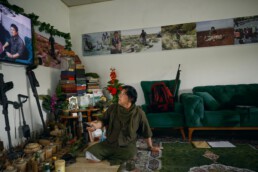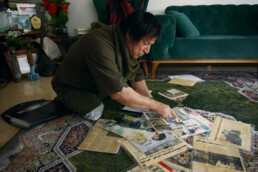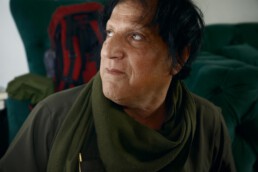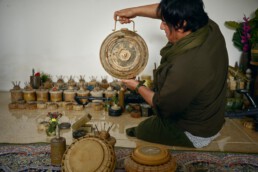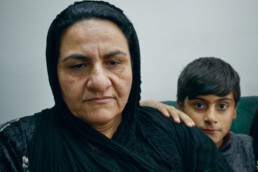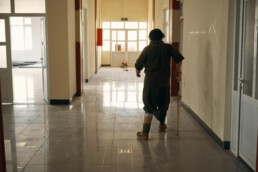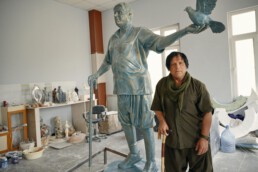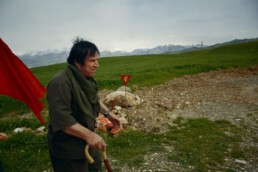N35° 10' 47.780" E45° 58' 55.315"
Hoshyar Ali – Hero without legs
The legs, or rather the fragments of the legs, are already there. Went ahead. To the cemetery. The right one went in 1989, the left one in 1994, ripped apart and separated by exploding landmines. Their owner continues to defuse landmines. Just without legs, on all fours. General and hero of Halabja. In the east of the Kurdistan region Iraq, not far from Iran.
Hoshyar Ali has defused about 2.5 million landmines. This has been recorded. In the green hills around Halabja; the city made headlines in 1988. Saddam Hussein’s henchman, General Ali Hassan Al-Majid, also known as Chemical Ali, poisoned the city. He had the rebellious Kurds, who did not want to be ruled by Saddam Hussein in Baghdad, misted with a lethal apple scent. Anfal, „loot,“ The campaign against the Kurds was called anfal, “loot”. Approximately 5000 men, women, infants and elderly inhabitants died miserably from this cocktail of poison gases that smelled of green apple. Ali was lucky that morning in 1988. He was on patrol with comrades in Penjuin, about 75 km north of Halabja.
His luck ran out in 1989. During the Iran-Iraq war, the Iranians and the Iraqis under Saddam Hussein had buried countless landmines. Mostly small, brown or green devices, the size of a tin of tuna. Even today, walking in some mountain regions is not safe and mountain farmers still ask Ali for help. Standing upright with the metal detector until the first mine ripped off his left leg in 1989. Ali carried on. Then, in 1994, an Italian brown mine as big as a sweets tin exploded and took his other leg. What was left of his legs was collected and now lies buried in the cemetery next to the grave of his son, who died in a car accident aged 17.
Ali continues to search and clear, with two prostheses from Japan. He was invited and celebrated by a Japanese NGO, but Ali didn’t like the food there. Not Kurdish, he says. His voice is energetic and loud. We are sitting on the floor. Dozens of newspaper articles in a multitude of languages and sealed in plastic lie on the floor, a testament to his celebrity status. Broadcasters from all over the world dedicated reports to him. A hero, yes, but one who also provokes an incomprehensible shaking of heads. What drives a father of two daughters and two sons to literally crawl on all fours through the dusty, stony fields and mountain slopes, defusing small and large monsters? It is my calling, says Ali Hashyar. For humanity. His wife, Geles, looks sad and thoughtful as the family settles down on the green sofa, her gaze trained down, into empty space . Does she fear for her husband? Every time he goes to work, she says, but she is also proud. He is doing his work for the sake of humanity.
Ali explains mines. His area of expertise. Some of the man-made monstrosities are designed to tear off the enemy’s foot, others aim at the abdomen. Larger explosives tear the chest and head into pieces. There are also the ones specifically for cars. Ali has the entire range lined up and stacked in the living room. Others set up their sports trophies as memorabilia; Ali has mines. There are reports about Ali on TV, including a feature by the German television broadcaster ARD. The question everyone asks is: why?
Ukrainians recently visited to ask Ali for help. He will not go to Ukraine. There is still enough to do here. Ali has been searching for 38 years; he is 61.
The city wants to set up a large statue of Ali next to the anfal Monument, standing with his prostheses. On the face of an American mine, his face determined. Keep moving forward, keep going. With the dove of peace just settling on his left hand, as it has during his lifetime. Larger than life.

